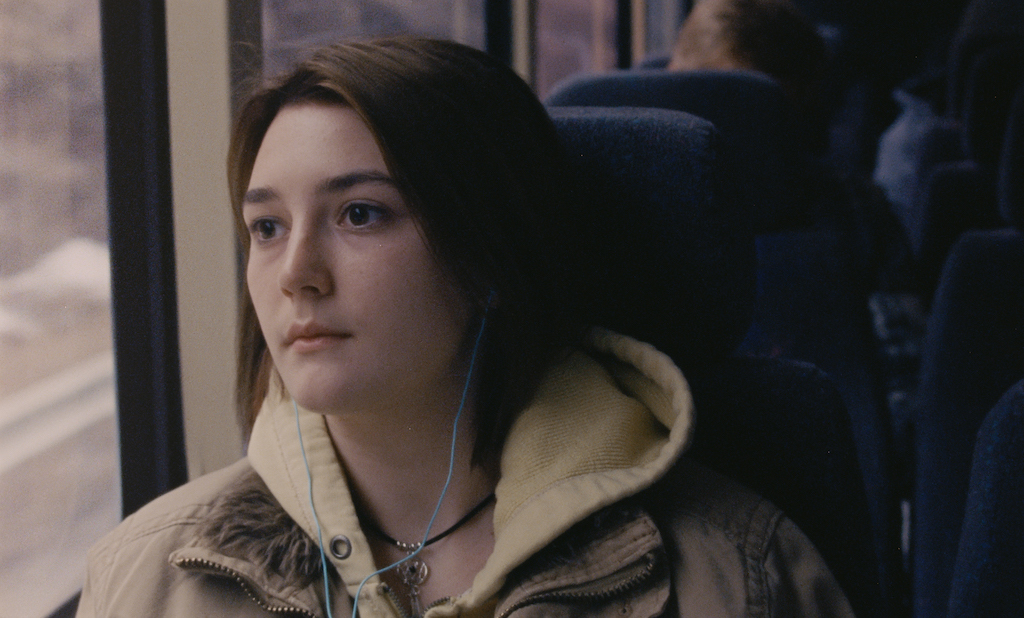
The vulnerability of women—all women, but particularly those who are pretty, young, and poor—is brought into sharp focus in Eliza Hittman’s grimly powerful Never Rarely Sometimes Always.
When we first meet 17-year-old Autumn (Sidney Flanigan), she’s on stage at a high school talent show. She’s playing the guitar and singing—there’s lots of tremulous emotion in her voice. From the audience, a boy coughs out the word “Slut!” and the crowd breaks into titters. Autumn pauses, somehow finding the strength to collect herself and continue.
Later, at a pizza restaurant, where Autumn’s stepfather chastises her for being sullen, another boy makes eyes at her. But he’s not being charming or bashful. He crudely simulates oral sex, trying to get a rise out of her.
At the supermarket where Autumn and her best friend Skylar (Talia Ryder) work, the skeevy manager makes remarks about what eye candy the two of them are. One customer flirts with Skylar and then seems to get aggressive when she turns down his invitation to a party.
Everywhere Autumn and Skylar turn, there are predators and threats, men who want something from them or simply see them as objects or playthings.
When Autumn suspects she might be pregnant, she goes to a local testing center, where they administer a drug store pregnancy test. They tell her she’s 10 weeks pregnant—and then tell her what a blessing it is. The center, it turns out, is nothing more than a pretense to show young women anti-choice propaganda and convince them to keep their babies.
When she gets home, Autumn downs a bottle of Vitamin C and pounds her stomach relentlessly, in a failed attempt to induce an abortion. Later, she Googles abortion centers in Pennsylvania and discovers that to get one, you need parental sign off.
That’s when she and Skylar (Talia Ryder) decide to head to Manhattan, where a minor can get an abortion without a parent’s permission. They steal money from the supermarket’s till, don hoodies, drag a giant suitcase, and take a bus into the city.
From there, Never Rarely Sometimes Always becomes a story of survival, resourcefulness, and friendship as the two girls navigate two days in the city with no place to stay and very little money. It’s downright Dickensian.
In some ways, Autumn is her own worst enemy. When she finds out the bad news—she’s 18 weeks pregnant, not 10 as she thought—the kind social worker assigned to her case asks if she needs a place to stay. (The 18 week procedure involves two appointments on two separate days.)
Autumn lies and says she’s good. The world has taught her to be self-sufficient, to assume the worst of people, to never be vulnerable. The wonderful Flanigan plays her with a steely determination that is all the more moving on those rare occasions when Autumn does break down.
The girls are on their own. Autumn and Skylar are so naïve they don’t seem to even know about youth hostels. First, they try to sleep in the bus station, but get kicked out. Then they try to sleep on the subway, but when a man begins masturbating in front of them, they bolt. They end up in an all-night arcade and a convenience store that sells Chinese dim sum (only in New York). Mixed in with the fear and danger is just the slightest bit of adventure.
Not all the men in Never Rarely Sometimes Always are threats. On the bus they meet Jasper (Theodore Pellerin), a city kid who takes a liking to Skylar and tries to goad the two friends to come downtown with him to a club. They say no, but call him the next day when they need money. He’s not a bad kid except for in the way all teenage boys can be casually cruel—he only pays attention to Skylar and basically ignores Autumn; he keeps insisting they join him “downtown.” When he does finally loan them money—easily withdrawing it from an ATM—he makes out with Skylar as a reward. In his mind, it’s romantic; in hers, it’s strictly transactional. In one of the film’s best scenes, as she kisses him, leaning against a pole in the subway, Autumn holds her hand in solidarity. They two friends can’t see each other—they’re on opposite sides of the pole—but they’re ineffably connected.
Eliza Hittman has made three films about teenage sexuality, longing, and alienation (the other two are It Felt Like Love and Beach Rats) and they’ve all been wonderful—understated, closely observed, deeply evocative. One thing she’s not? Sentimental. I kept waiting for a moment when Autumn would embrace Skylar, thank her being such a good friend, for being her ride or die. The closest thing we get is that scene in the subway. Two friends, fingers interlocked, in a gesture that says, “I got you.”
Never Rarely Sometimes Always is now available On Demand.
